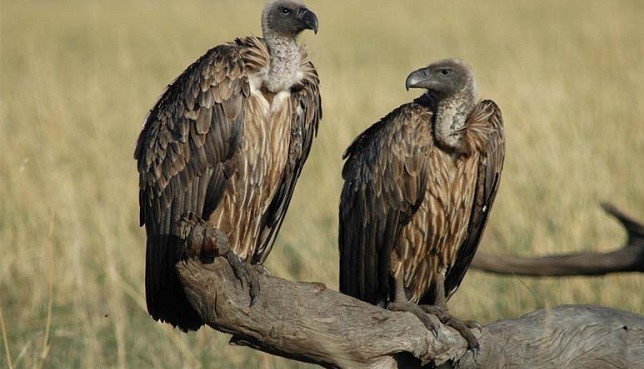Environmentalists note that although vultures are viewed with disdain – dirty, ugly and unhygienic birds – they play fundamental roles in protecting the environment by scavenging activities.

Underscoring the importance of vultures, the Nigerian Conservation Foundation (NCF) observed the International Vulture Awareness Day recently, describing vultures as environmental sanitary officers with a clean-up service.
Dr. Joseph Onoja, the Director of Technical Programmes of the foundation, explains: “Without vultures, humans are vulnerable to the spread of infectious diseases, because, in the absence of vultures, dogs and rats become the clean-up crew.
“The danger in this is that these animals – dogs and rats – are not equipped for such and are close to human population, exposing humans to diseases.’’
Similarly, some cultures rate the importance of the vulture high, making vultures to take part in traditional funeral activities by placing bodies in high places for vultures to eat up.
Explaining the capacity of the vulture in this regard, zoologists observe that the vultures can quickly devour large amounts of flesh and the acids in them can neutralise pathogens to limit the spread of bacteria and diseases.
However, in some other communities, vultures face threats such as elimination, lead poisoning, persecution and habitat destruction, resulting in death of most of the birds.
Critics of the existence of vultures among humans insist that vultures have somewhat bad reputation; eating human bodies and rotting animals and pretty strange habits that vomit when feeling threatened and urinating indiscriminately.
Despite this, Mr Joseph Effiong, an environment and development expert, says vultures recycle many important nutrients in the environment.
“An ecosystem without vultures would be like a city without waste removal services; vultures do their work for the ecosystem very efficiently.
“They consume the meat of dead animals very quickly, which reduces the risk of large colonies of insects gathering around the animal bodies.
“Give them an inch and they’ll take a mile! In doing so, vultures limit the risk of disease in ecosystems by keeping insect populations in check.
“Not only is this beneficial to us as humans, but also to the agricultural industry, since vultures also help prevent livestock from getting sick,’’ he said.
But Mr Suileman Muhammad from Biological Sciences Department, Federal University of Dutse, Jigawa, says vultures in extreme pressure from a range of human activities are the most threatened group of birds on earth.
“In recent decades, drastic and widespread vulture population declines, whereas vultures provide critically important ecosystem service by cleaning up carcasses and other organic waste in the environment.
“We really can`t afford to lose them because, by cleaning up the carcasses, they help to reduce the spread diseases such as anthrax and rabies, among others,’’ he explains.
Mr Abubakar Ringim, also a lecturer from the same department of the university, explains further that vultures’ population began to decline in the 19th century in Europe and North America.
He observes that more than a hundred years ago, some populations of bearded vulture and the California condor, a new world vulture and the largest in North America, were already near extinction.
He says the populations of eight species of vultures assessed in Africa have shown 62 per cent decline, while more than 60 per cent of vultures worldwide are threatened with extinction, mostly in vulture-rich regions of Asia and Africa.
“Seven of Africa’s vulture species are on the verge of complete disappearance. Historical and recent vulture population declines. Prior to the mid-20th century, decline in Cape vulture and others had already begun in Asia.
“Although over this period, vultures were still abundant, significant difference in abundance, species and in population trends varied within regions and among continents.
“In Africa, vulture population decline occurs mostly in East and West Africa; and in West Africa, population of vultures except the hooded vulture, has declined by an average of 95 per cent.
“In protected areas within the Sudanese zone, vulture populations fell by nearly 42 per cent by poisoning from highly toxic pesticide in 2012.
“Similarly, 144 white-backed vultures, an old-world vulture and the most common large vulture in Africa vultures, were killed in Zimbabwe after feeding on elephant carcasses,’’ he says.
Explaining further on the benefits of vultures, he notes that vulture can be used for treating of psychological diseases.
Ringim notes that absence of vultures may lead to pollution of water by dead animals as dead animal attracts flies and disease carrying bugs.
According to him, free ecological service provided by vulture will no longer be there and absence of vultures causes loss of culture, value and heritage.
He expresses concern that the Nigeria Conservation Foundation teams surveyed no fewer than eight local government areas in Yobe, covering more than 1,436 kilometre in October 2018, without sighting a single vulture.
“Similarly, in November 2018, two teams independently conducted a road transect survey of 2,783 kilometres in Jigawa, and 2,110 kilometres in Yobe without a single sight of vulture species.
“Again, the teams also visited sites that should typically have vultures, including abattoirs, slaughterhouses, slab and rubbish dumps.
“In 2017, Egyptian Vulture New LIFE project, one of the most ambitious ever vulture conservation initiatives, was launched with support from the European Union Life programme in partnership with institutions and organisations from 14 countries, including Nigeria.
“The essence of the project is to sensitise people to the importance of vulture and how to address drastic and increase vulture population,’’ Ringim explains.
The lecturer, therefore, advises that people should discourage the killing and use of vulture body parts for medicine or other traditional rituals.
He calls on relevant stakeholders to strongly embark on campaigns about the critical roles and importance of vultures to ecosystem.
“People should change from negative attitude and perceptions they have towards vultures, preserve them, observe their right to life and keep the environment for human healthy living.
By Vivian Emoni
